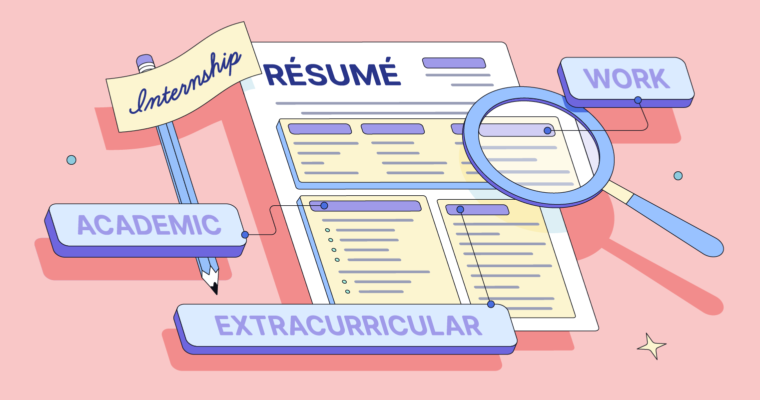
So you want to switch careers, but your résumé doesn’t reflect the experience you think you need to land a job in a new field. You might feel like you won’t qualify for jobs in another industry or like you should just give up trying to apply altogether.
Push those fears aside; you’d be surprised at what recruiters are actually looking for! Here are five ways you can optimize your résumé for a career change, and they all relate to how your experiences will translate to your new role.
In this article, you’ll learn how to update your résumé to change industries. First, we’ll walk through the research you should conduct before you start shifting your résumé. Then, we’ll show you how to reword your experience to make it more relevant to your new career.
Do your research
Before you begin updating your résumé, you’ll need to gain more information about the language your new industry uses. Every company and job description will be a little bit different.
Here’s what you should keep an eye out for:
- Résumé keywords
- Transferable skills you possess
- Industry jargon and sector-specific terms
Research what your new sector requires and how different places describe jobs on their career page so you can better understand how you might fit in. Pick out résumé keywords in the job description that you can use later when you’re updating your résumé’s wording.
For every job you’re interested in, look into the company further—learn the company’s or organization’s background, what its goals are, and its landmark projects or products. Think about how your current skills could apply to the role you want and the company’s values at large.
Another great way to gather this information is by talking to people who are already in the industry. Even informal conversations and informational interviews will help you better understand what they look for in candidates or coworkers. Try connecting to people on LinkedIn to see if they have time for a quick informational interview or coffee chat over video.
5 ways to update your résumé
Now that you’ve laid the foundation, it’s time to get to work. Here are five ways to update your résumé to land a job in a new industry or career.
Before you begin making these updates, it might help to gather the following:
- A list of all the skills and jobs you’ve held in the past
- A list of the résumé keywords and jargon you found in your research
- A fresh résumé template
You’ll see examples throughout this guide. We’ll include examples for someone transitioning from being a graphic designer to a software engineer, a lab specialist to a nurse, and a data analyst to a financial planner.
1 Find overlap
Refer back to the homework you did earlier. Highlight skills from your current job or recent past that can be useful in your new industry.
Here are five examples of skills that transfer well:
- Familiarity with software
- Collaborative work
- Attention to detail
- Strong communication
- Management experience
Old résumé
Graphic Designer, Mozilla
October 2019–present
- Designed more than 120 video assets for public campaigns
- Leveraged music, voice-over, and sound effects to enhance video content
- Improved ad performance by 19% with an interdepartmental, asynchronous team
New résumé
Graphic Designer, Mozilla
October 2019–present
- Created design standards for motion graphic assets to improve brand consistency across six teams
- Integrated new software for music, voice-over, and sound effects to enhance video content
- Worked with editorial, product marketing, social, and creative teams to design video assets in Adobe Photoshop and InDesign, improving ad performance by 19%
2 Translate your role
Call out the parts of your work that are similar to what the new role requires. You might already have the experience they’re looking for in project management, editorial judgment, or budget management. Make your résumé more compelling by using action words when you present your experience.
Old résumé
Lab Specialist, American Red Cross
September 2019–December 2022
- Provided customer services
- Trained on ADVIA, Sysmex, pH meter, and COBE cell processor
- Performed blood collection procedures
- SQUIPP and OSHA certified
- Prepared lab reports, sample logs, FDA-regulated documentation, and certificates of analysis/conformity
New résumé
Lab Specialist, American Red Cross
September 2019–December 2022
- Provided customer service to incoming patients
- Trained on ADVIA, Sysmex, pH meter, and COBE cell processor
- Conducted whole blood collection procedures
- Performed donor health history screenings and interfaced with donors during blood collection to ensure comfortable needle etiquette
- Prepared accurate lab reports, sample logs, FDA-regulated documentation, and certificates of analysis/conformity
3 Demonstrate eagerness and adaptability
Wherever you can, show how you’ve worked in different roles, used a range of skill sets, and are eager to learn. How have you adapted easily to new fields and systems before? Give specific examples of essential skills, systems, or software you learned at your previous jobs, wherever possible.
Old résume
Data Analyst, Mint
May 2019–present
- Built forecasting for quarterly earnings reports
- Automated CRM reports for sales teams
- Implemented new security guidelines
- Shared presentations on ad hoc research to upper-level management
New résumé
Data Analyst, Mint
May 2019–present
- Built forecasting for quarterly earnings reports using parameters, trend lines, and reference lines that were reported to stakeholders for quarterly earnings reports, saving 160 hours of manual labor annually
- Automated CRM reports for sales teams using filters and parameters in SQL, improving conversion rates by 20%
- Implemented new security guidelines using row-level security, reducing private data exposure by 78%
- Simplified technical SQL processes and team progress reports in presentations to upper-level management
4 Use the introduction wisely
The introduction of your résumé is sometimes called the summary, background, personal, mission, objective, or purpose statement. Whatever you want to call it, take advantage of this section when you’re updating your résumé.
This paragraph is a space to make a case for how your previous experience translates to the position you’re applying for. Unlike a work experience entry, you can use this paragraph to draw on your prior experience in a fluid and compelling way. Consider the summary statement as a kind of elevator pitch.
If you have any gaps in your résumé, this is also the place to talk about it. Don’t use up too much space here, but mentioning that you recently got certified in a new skill can easily cover this intermission in your work history.
Include the following for an effective career-changing personal statement:
- Who you are
- Why you’re changing your career
- Your new goals
- How your previous experience can be transferred to this new industry
- Why you’re a great fit for the job
Old résumé
Experienced graphic designer with six years of experience eager to help Dice optimize their assets for better social media engagement. I’m a detail-oriented designer with an eye for efficiency. I hope to be a valuable and engaged player on Dice’s creative teams in this long-term position.
New résumé
I’m a graphic designer with six years of work experience who recently completed a certification in software engineering. I’m a quick learner eager to join Dice’s team as a Web Developer. I believe that my experience in collaboration, team leadership, and process optimization makes me an effective problem solver who will make a great addition to your team.
5 Cut unnecessary information
You’ll have only a few minutes to impress a hiring manager or recruiter; you don’t want to waste them on unnecessary information. Exclude information that has no relation to the job or industry you’re seeking to work in. Unless the information demonstrates a characteristic or skill set you think would be helpful to your current applications, it’s not necessary to include it.
Be persistent
Changing industries or roles can be a big professional step, and you won’t always be able to do it on the first try, or even the fifth. But just because you don’t find instant success doesn’t mean you should stop trying. Refining your résumé and approach over the course of many applications and interviews may end up being your route to a new role.






